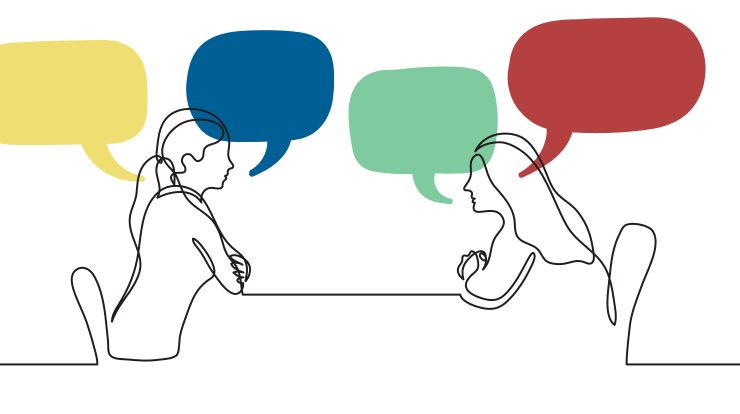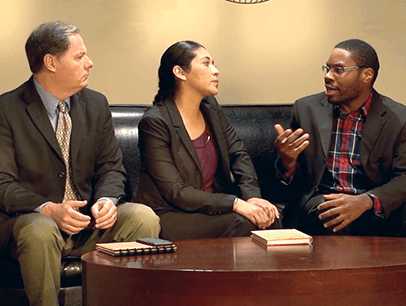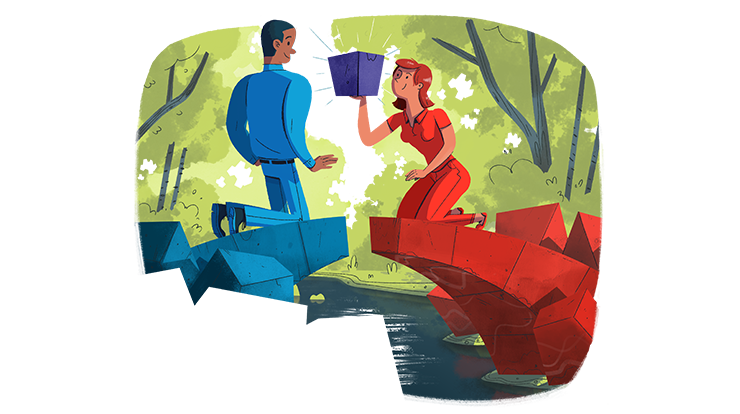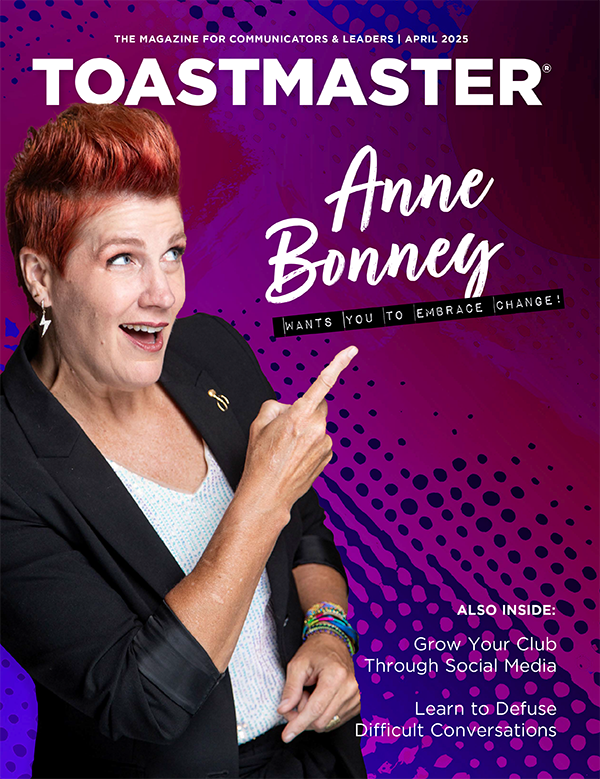
“Peace is not the absence of conflict but the presence of creative alternatives for resolving conflict.”
—American journalist Dorothy Thompson
John and Mary, a couple married for more than 20 years, received a larger than usual tax refund. They disagree about what to do with the money. John wants to put it in their retirement fund, while Mary wants to use it for their annual vacation. The couple have had several arguments and are not sure how to resolve the issue.
Jack, a graphic designer, has asked his boss, Lily, for a raise. Lily, however, does not feel he has earned it. Jack believes he has worked extra hard on getting new clients in the past year. Both now feel awkward around each other at the office.
Sam was recently elected President of his Toastmasters club. He is concerned that Sharon, the new Vice President Education, is not handling all her responsibilities: Several members have not had their Pathways level-completions accepted and the club did not hold a speech contest this spring because Sharon put off assigning a speech contest organizer until it was too late. Sam is irritated and Sharon has not been communicating with him.
“It is very important that you be curious, be open, and be receptive. Don’t judge. Listen.”
—Chris Ford, DTM, Toastmasters International President, 2007–2008When you are in a relationship—of any kind—you will find that conflict isn’t unusual. For most of us, such situations can be uncomfortable and upsetting. But they don’t have to be. If you look at conflict from a different perspective, listen to the other person with respect and understanding, and tackle issues early, and directly, the results might be better than you imagined.
Why Do We Struggle?
Conflict happens when people perceive things differently, such as in our examples at the beginning—how things should be done, how money should be spent, or what an end result should be.
While it may be tempting to ignore the situation and hope it goes away, or get angry about the situation, or gossip to others, researchers have found that straightforward communication is key to resolving conflict. And how you manage and communicate your message is the most important factor.
What are some strategies to resolve conflict? Here are three points to keep in mind.
1 Conflict may not be a bad thing. Change your perspective.
Humans tend to see conflict in negative terms—war, confrontation, divorce, anger, combat. But conflict itself doesn’t have to be viewed that way, says Amber Hill Anderson, an attorney and former Toastmaster from Denver, Colorado, who frequently uses mediation and negotiation in her cases. “Conflict is an opportunity. … Conflict is helpful when utilized to reflect, reimagine, and re-create.”
Reimagining a conflict—viewing it from a different perspective—is a good way to settle a disagreement, says Dana Caspersen, author of Changing the Conversation: The 17 Principles of Conflict Resolution. Instead of responding in anger or with an attack when someone criticizes or disagrees with you, see the conflict as an opportunity to further develop your relationship with the other person. If you are making things worse in the conflict, stop, she suggests. Appeal to the other person’s best self. A key solution is to assume undiscovered options exist. This allows both parties to find solutions that each can support.
Kory Floyd, a professor of communication at the University of Arizona, says that working in a constructive manner on a conflict can help relationships. Often, the parties believe that their goals are incompatible when in fact there is likely a workable solution. He specifically cites finances as a key source of conflict in marriages.
In the earlier example of John and Mary, the two are arguing over how to spend a tax refund. While they may see the goals as incompatible, both parties want to spend the money wisely. They could decide to divide the money in half for each of their goals or spend the money on another goal. The solution is there. It just has to be found.
2 Understand the other person’s point of view.
Conflict does not have to be a zero-sum game where one party wins and the other loses. Both parties can win if each understands the other’s viewpoint.
Chris Ford, DTM, Toastmasters International President from 2007 to 2008, has taught a class for Toastmasters officers called Conflict is Inevitable—Combat is Optional.
“It is very important that you be curious, be open, and be receptive,” says Ford. “Don’t judge. Listen.”
Anderson, the attorney, admits that it is often hard to understand the other person when in the middle of a conflict. However, she stresses the importance of understanding the other person’s perspective. “Considering the arguments, experiences, fears, emotions, and interests of others opens up the realm of solutions and does not need to involve abandoning one’s own interests,” she says.
If Sam and Sharon want their Toastmasters club to be successful, they need to understand each other. Sharon may feel overwhelmed with the role of Vice President Education and need to establish committees to help with her various responsibilities. She may also need additional training. Sam may need to set clearer timelines and expectations, along with finding the best way to communicate with her on a regular basis. Understanding what each other needs will go a long way to a productive working relationship.
3 Get to the conflict early. Don’t wait to resolve.
Ford, a member of Manotick Toastmasters in Manotick, Ontario, Canada, uses the acronym ELI: Early, Local, and Informal. It also stands for Effective Leadership Intervention.
“For a conflict to be resolved successfully, get to it as early as possible,” says Ford.
Floyd, the communications professor, has a similar outlook. He notes in his book Interpersonal Communication that humans tend to avoid conflict because it can be uncomfortable. But waiting to cope with conflict, says Floyd, will not solve the problem—it will only escalate it, making it harder to resolve.
Ford suggests that not only should leaders attempt to resolve conflicts early, but they also should do it locally without involving a higher authority, if possible. For example, Jack and Lily should see if they can resolve his request for a raise on their own before taking the issue to Lily’s boss. The fewer people involved, the better.
In Jack and Lily’s case, perhaps they could establish tangible guidelines on what constitutes the kind of job growth that warrants a raise. That way, there is clear and mutually agreed-on proof of Jack’s progress. Or maybe there are other factors to consider regarding a raise, such as the company’s financial picture.
Ford also says that conflict resolution does not have to be a lengthy process—it can be informal.
“Effective leadership intervention is what leaders do,” he says. “It is insufficient to shrug it off, hoping that it will go away, or refer it to someone else.”
By seeing conflict in a more positive way, by listening to others and opening a dialogue, we can resolve the conflict as well as repair and strengthen our relationships.
Peggy Beach, DTM is a freelance writer and communications instructor in Raleigh, North Carolina. She is a Past District 37 Governor. A member of the Hi Rise Toastmasters in Raleigh and the Top Triangle Toastmasters in Morrisville, she is available at writereditorpeggybeach@gmail.com.
Related Articles

Communication
Mastering Controversial Conversations

Leadership
How to Disagree Diplomatically

Communication
A Toastmasters Guide to Civil Social Communication

Communication





 Conflict Resolution Resources
Conflict Resolution Resources
 Previous Article
Previous Article